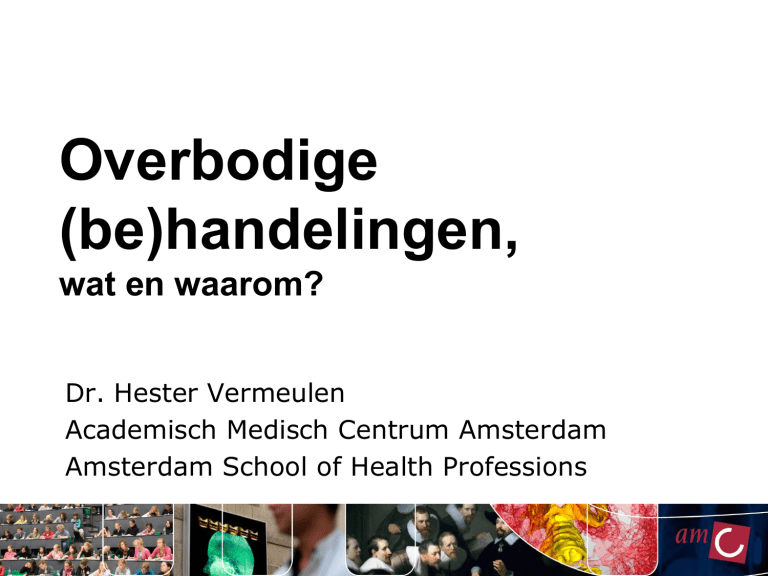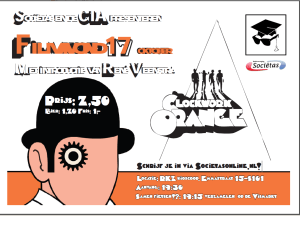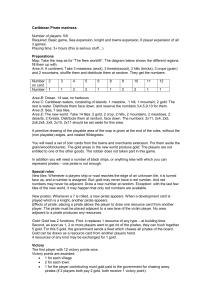
Overbodige
(be)handelingen,
wat en waarom?
Dr. Hester Vermeulen
Academisch Medisch Centrum Amsterdam
Amsterdam School of Health Professions
Who is who?
Hoogmoed
Lust
Gierigheid
Woede
Traagheid
Gulzigheid
Afgunst
Overbodige
(be)handelingen,
wat en waarom?
Wat?
• Onnodige, overbodige, onduidelijke en onaffe zorg
• Geen bewijs, toch doen!
• ‘algemeen aanvaarde handelingen waarvan de
effectitiveit ontkracht kan worden op basis van
wetenschappelijke inzichten’
• Peri operatieve zorg (5)
• scheren, laxeren,
nuchter houden,
maagsonde,
temperaturen
• Decubitus (6)
• Katheter, ijzen &
fohnen, windring,
handschoenen,
schapenvachtjes
Wat?
Wat?
• Overdiagnostiek
– X-thorax door huisartsen en intensivisten
– Gewoonweg overdoen
• Overbehandeling
– Antibiotica na varices operatie
– Doorsturen naar fysiotherapeut
• Overcontrole
– Bijhouden vochtbalans
– Jarenlang periodieke controles COPD patiënten
Valium voor de dokter
• Veel diagnostiek is als valium voor de dokter
• Mitrailleur diagnostiek
Valium voor de dokter
• Veel diagnostiek is als valium voor de
dokter
• Mitrailleur diagnostiek
Overbodige
(be)handelingen,
wat en waarom?
Waarom?
• Een van de 7 zonden?
– Hoogmoed?
– Hebzucht?
• Omdat we ook maar mensen zijn?
• Arrogantia?
– David Sackett
• Een aardige dokter gevonden worden?
• Om niks te missen, vooral in opleidingssituatie?
• Mondigheid van de patiënt?
• We prefer stories to statistics
• We seek to confirm, not to
question our ideas
• We rarely appreciate the role
of chance and coincidence in
shaping events
• We sometimes misperceive
the world around us
• We tend to oversimplify our
thinking
• Our memories are often
inaccurate
Stories and statitics
• We prefer stories to statistics.
• "Although Consumer Reports rates the car you re
considering as very reliable, a colleague of yours
owns that model and complains that it has been
nothing but trouble. Would you still buy the car? In
general, people trust unique personal experiences
over 'impersonal' data, even though the statistics
represent the aggregated experiences of many
people."
Seek to confirm
• We seek to confirm rather than question our beliefs.
• "This confirmation bias leads to stereotypes and
prejudices as well as to pseudoscientific
thinking. For example, if you believe in moon
madness, you will notice the occasional crazy driver
on a moonlit night without noticing all the other
drivers (including yourself) that are driving normally."
Narrative vs systematic
review
• “Take a simmering topic, extract the
juice of an argument, add the essence
of one filing cabinet, sprinkle liberally
with your own publications and sift
out the work of noted detractors or
adversaries”
Oversimplify thinking
• We have a tendency to oversimplify our thinking.
• "The heuristics [problem solving methods, especially
trial-and-error] we use to guide our thought
processes help us prevent information overload and
let us make decisions in a timely manner. However,
these mental shortcuts can also lead us widely astray
and leave us vulnerable to deception by those who
wish to manipulate us."
Waarom?
• Een van de 7 zonden?
– Hoogmoed?
– Hebzucht?
• Omdat we ook maar mensen zijn?
• Arrogantia?
– David Sackett
• Een aardige dokter gevonden worden?
• Mondigheid van de patiënt?
David Sackett
Overbodige
(be)handelingen,
wat en waarom?
Wat nu?
Wat nu?
•
•
•
•
Nederigheid
Zelfreflectie
Kritisch kijken naar eigen handelen
Uitgaan van de toegevoegde waarde voor patiënt
• Variatie in zorg in kaart brengen
• NVAG themamiddag!
Leerpunten












